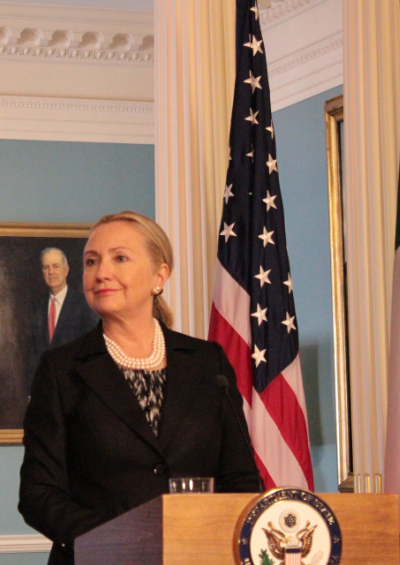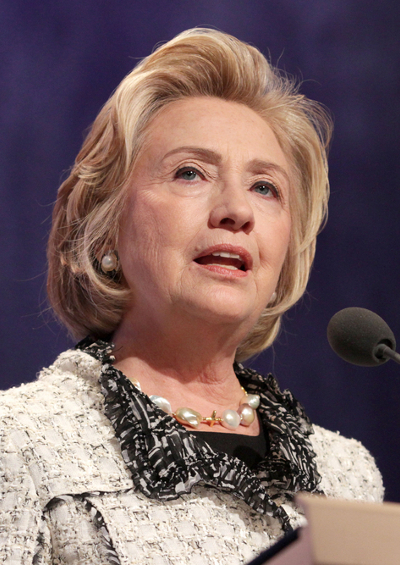Candidate Clinton: The Foreign Policy Dimension
Hillary Clinton should shift course on her foreign policy as she launches her second presidential campaign.
April 14, 2015

From a global perspective, Hillary Clinton’s instincts on foreign policy, despite serving for four years as U.S. Secretary of State and eight years as a U.S. Senator, raise serious questions about what her presidency would look like.
That finding applies completely independent of the contrived Republican Party sideshow surrounding the September 2012 events in Benghazi.
The main concern – beyond the lingering damage of her 2002 vote for the catastrophic Iraq War – is that Mrs. Clinton is an unabashed advocate not just of American exceptionalism, but of American supremacy.
In Clinton’s view, the apparent purpose of America’s existence is to lead the world. That may be standard Republican Party mantra, but Democratic candidates should be enlightened enough – and honest enough with American voters – to know better. At a minimum, the rest of the world has moved on from that notion over the past 15 years.
What such vacuous quasi-imperial leadership claims result in has been amply demonstrated by George W. Bush. One positive outcome of his ill-fated leadership is that his country now has little appetite to repeat that experience, and the world will not tolerate it.
Hillary Clinton apparently hasn’t gotten that memo yet. To inoculate herself against charges of weakness, she is reported to be keen to attract the smarter part of Mr. Bush’s foreign policy thinkers for her pursuit of a more muscular foreign policy.
She sees that approach not only as a natural extension of positioning herself as the Obama Administration’s “hawk” while serving as U.S. Secretary of State, but also tactically as protection against the Benghazi (non-)issue becoming a campaign liability.
The broader question here is whether the Democrats – or even many independents – really want a candidate to be more like the Republicans on foreign policy.
None of this augurs well for her 2016 campaign – or possible presidency – on foreign policy. That won’t keep her from clinging to her positions.
The Russian Reset
One other item she seems settled with is the now (in)famous ““reset” with Putin’s Russia. According to the widely held perception, she engaged in an attempt to manage foreign policy not based on realism, but on a desperate PR attempt to do something “new.”
In fact, it turns out that, while she had a hand in it, she basically just carried out the mission of her two bosses. Vice President Biden was the first to use the phrase “reset button” and he said it was coming from “The White House.” Then President Obama used it, in reference to missile shield deployments, days before Clinton’s presentation to the Russian Foreign Ministry.
In this case, Clinton had the misfortune of being the person in all the photographs of the debacle, which now looks quite foolish in light of the subsequent developments in Ukraine. In retrospect, it makes her appear to be a soul mate of George W. Bush, the man who famously claimed to have looked into Mr. Putin’s eyes – and discovered his “soul” (as if the latter had one).
Despite that particular incident probably not being Mrs. Clinton’s fault, it provides further fodder to those who believe constant aggressive posturing is the only way to maintain American supremacy, security or dominance. She will be tempted to meet them on their terms to avoid defending the move’s merits, rather than making a case for diplomacy over misguided shows of force.
The Russian Reset did not, as hoped, restrain Russian threats in Eastern Europe. She is not likely to want to argue for such dovish measures again, even at the risk of missing some true opportunities for reconciliation with governments less backward than Putin’s regime.
Sexism and foreign policy
Indeed, one must also feel somewhat sorry for Mrs. Clinton. She does have to cope with that peculiar American case of latent sexism, which harbors doubts about women as the top leader.
The fact that this worry has been disproven in many nations around the globe and puts the United States into uncomfortable partnership with both modern Russia and China – both very “masculine-minded” regimes – really says it all about the irrelevance of such stereotypical thinking.
Takeaways
Mrs. Clinton is an unabashed advocate not just of American exceptionalism, but of American supremacy.
Hillary Clinton’s instincts on foreign policy raise serious questions about what her presidency would look like.
Clinton will have to cope with America’s latent sexism, which harbors doubts about women as the top leader.
Hillary Clinton is falsely blamed for coming up with the idea for a “reset” in relations with Russia. Biden and Obama were first.
In Clinton’s view, the apparent purpose of America’s existence is to lead the world.

